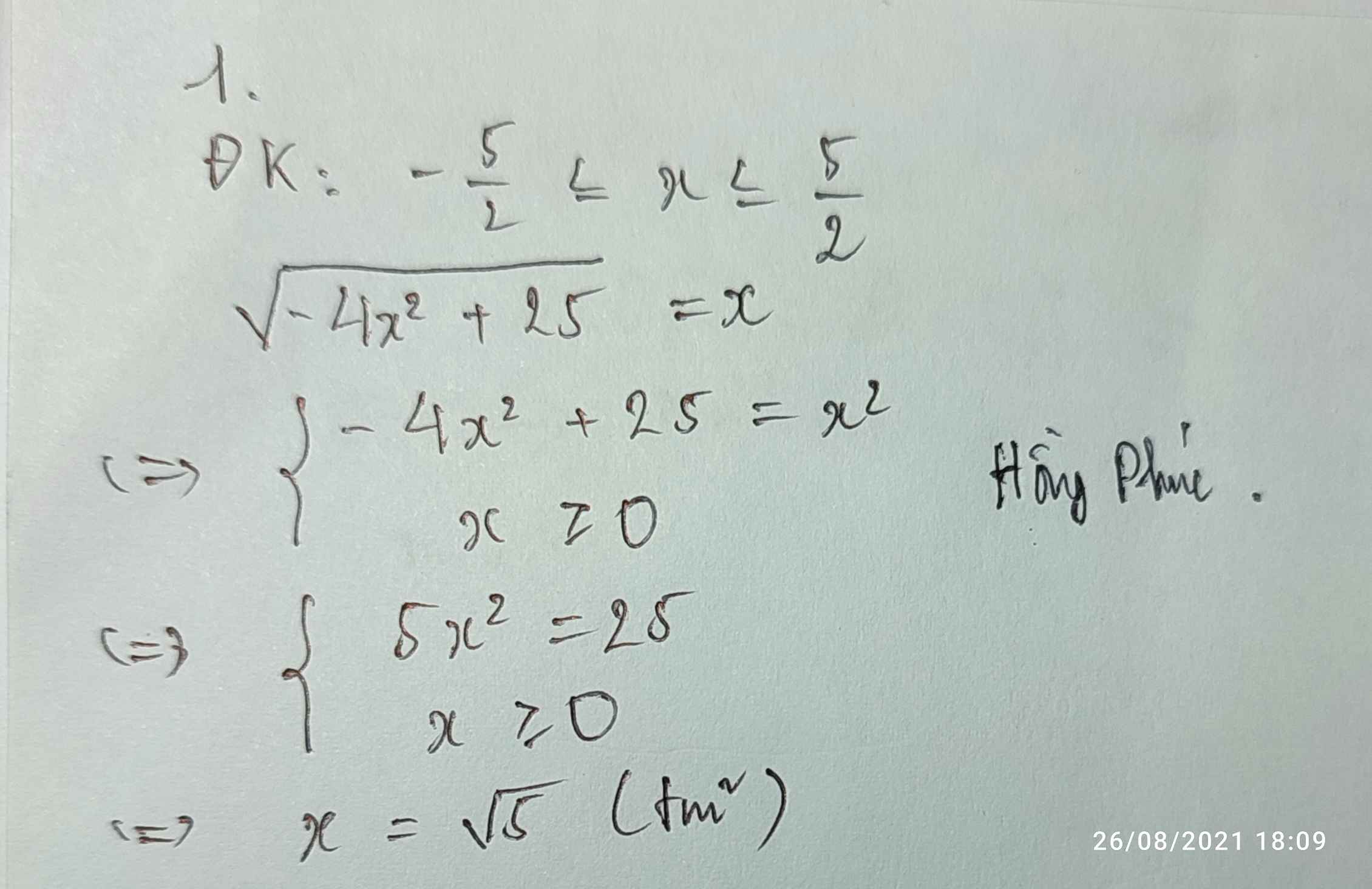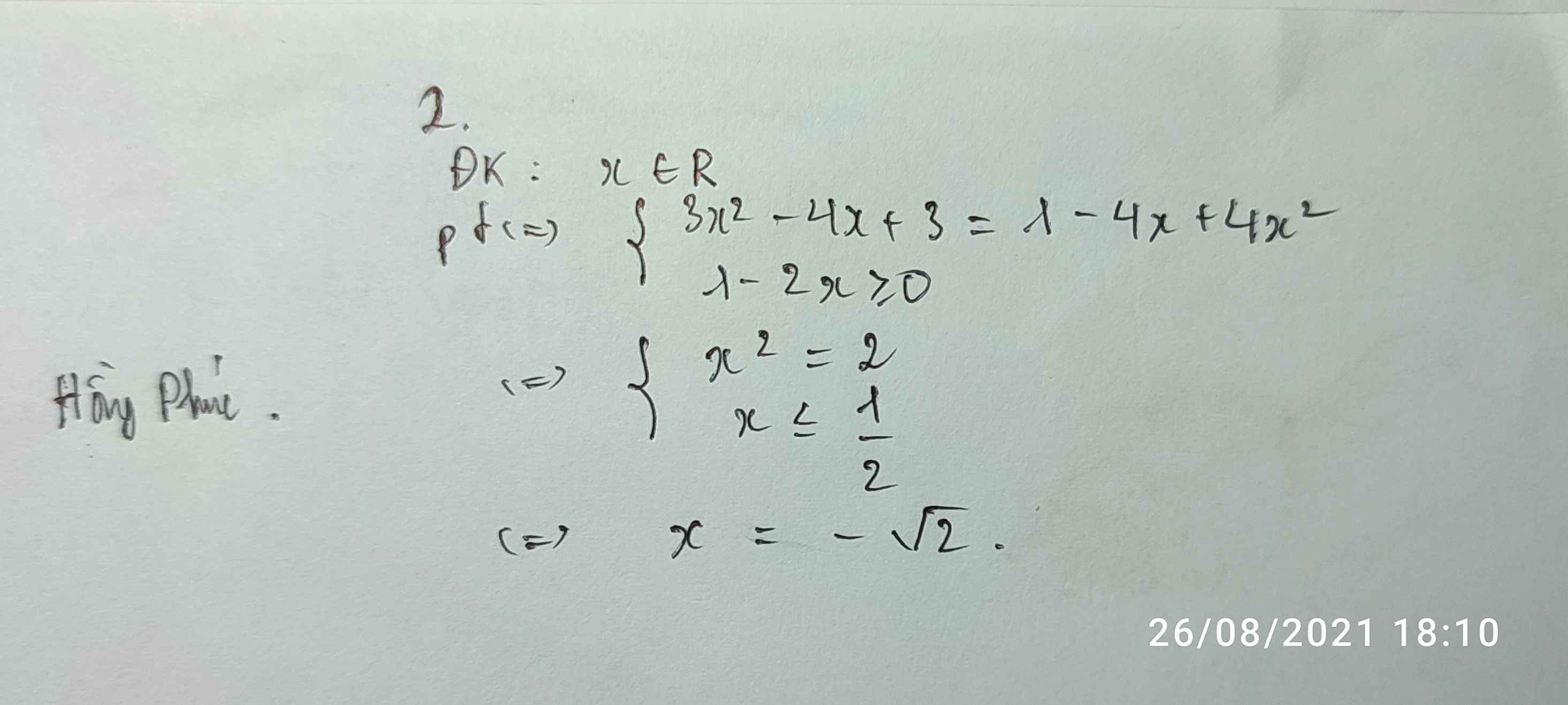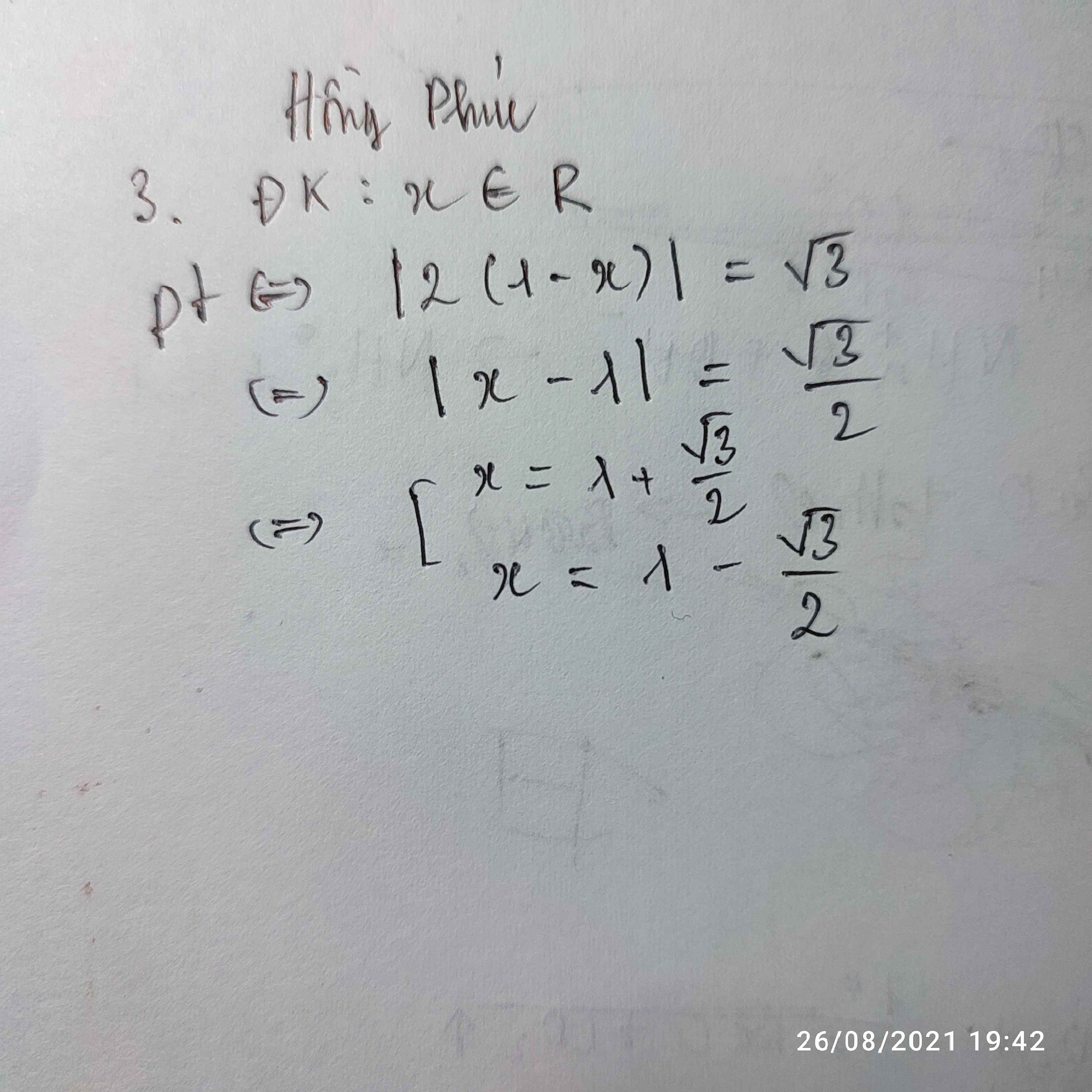|4x - 3| - |x + 1/5| = 0

Những câu hỏi liên quan
Bài 1: Giải phương trình và bất phương trình sau: 1. 5.(2-3x). (x-2) = 3.( 1-3x) 2. 4x^2 + 4x + 1= 0 3. 4x^2 - 9= 0 4. 5x^2 - 10=0 5. x^2 - 3x= -2 6. |x-5| - 3= 0
10x+3/12=1+6:8x/9
2x+7x5 5x+1=0
2x(x-5)-x+5=0
(x+3)^2-(5-x)(x+3)=0
(x+2)(3-4x)=x^2+4x+4
bạn viết rõ đề câu a;b nhé
c, \(2x\left(x-5\right)-\left(x-5\right)=0\Leftrightarrow\left(2x-1\right)\left(x-5\right)=0\Leftrightarrow x=\dfrac{1}{2};x=5\)
d, \(\left(x+3\right)\left(x+3-5+x\right)=0\Leftrightarrow\left(x+3\right)\left(2x-2\right)=0\Leftrightarrow x=-3;x=1\)
e, \(\left(x+2\right)\left(3-4x\right)=\left(x+2\right)^2\Leftrightarrow\left(x+2\right)\left(3-4x-x-2\right)=0\)
\(\Leftrightarrow\left(x+2\right)\left(-5x+1\right)=0\Leftrightarrow x=-2;x=\dfrac{1}{5}\)
Đúng 4
Bình luận (1)
a. 4x-3=0
b. -x+2=6
c. -5+4x=10
d. 4x-5=6
h. 1-2x=3
2.a
(x-2).(4+3x)=0
b) (4x-1).3x=0
c) (x-5).(1+2x)=0
d) 3x.(x+2)=0
3)giẳi pt và biu diễn trục số
a) 3(x-4)-2(x-1)≥0
b) 3-2(2x+3)≤9x-4
c) 5-2(1-3x)≥-2x+4
d) 9-3(x-1)≥4x-5
Bài 1. a) 4x - 3 = 0
⇔ x = \(\dfrac{3}{4}\)
KL.....
b) - x + 2 = 6
⇔ x = - 4
KL...
c) -5 + 4x = 10
⇔ 4x = 15
⇔ x = \(\dfrac{15}{4}\)
KL....
d) 4x - 5 = 6
⇔ 4x = 11
⇔ x = \(\dfrac{11}{4}\)
KL....
h) 1 - 2x = 3
⇔ -2x = 2
⇔ x = -1
KL...
Bài 2. a) ( x - 2)( 4 + 3x ) = 0
⇔ x = 2 hoặc x = \(\dfrac{-4}{3}\)
KL......
b) ( 4x - 1)3x = 0
⇔ x = 0 hoặc x = \(\dfrac{1}{4}\)
KL.....
c) ( x - 5)( 1 + 2x) = 0
⇔ x = 5 hoặc x = \(\dfrac{-1}{2}\)
KL.....
d) 3x( x + 2) = 0
⇔ x = 0 hoặc x = -2
KL.....
Đúng 0
Bình luận (0)
Bài 3.a) 3( x - 4) - 2( x - 1) ≥ 0
⇔ x - 10 ≥ 0
⇔ x ≥ 10
b) 3 - 2( 2x + 3) ≤ 9x - 4
⇔ - 4x - 3 ≤ 9x - 4
⇔ 13x ≥1
⇔ x ≥ \(\dfrac{1}{13}\)
Đúng 0
Bình luận (0)
Giải phương trình:1. x^4-6x^2-12x-802. dfrac{x}{2x^2+4x+1}+dfrac{x}{2x^2-4x+1}dfrac{3}{5}3. x^4-x^3-8x^2+9x-9+left(x^2-x+1right)sqrt{x+9}04. 2x^2.sqrt{-4x^4+4x^2+3}4x^4+15. x^2+4x+3sqrt{dfrac{x}{8}+dfrac{1}{2}}6. left{{}begin{matrix}4x^3+xy^23x-y4xy+y^22end{matrix}right.7. left{{}begin{matrix}sqrt{x^2-3y}left(2x+y+1right)+2x+y-505x^2+y^2+4xy-3y-50end{matrix}right.8. left{{}begin{matrix}sqrt{2x^2+2}+left(x^2+1right)^2+2y-100left(x^2+1right)^2+x^2yleft(y-4right)0end{matrix}right.
Đọc tiếp
Giải phương trình:
1. \(x^4-6x^2-12x-8=0\)
2. \(\dfrac{x}{2x^2+4x+1}+\dfrac{x}{2x^2-4x+1}=\dfrac{3}{5}\)
3. \(x^4-x^3-8x^2+9x-9+\left(x^2-x+1\right)\sqrt{x+9}=0\)
4. \(2x^2.\sqrt{-4x^4+4x^2+3}=4x^4+1\)
5. \(x^2+4x+3=\sqrt{\dfrac{x}{8}+\dfrac{1}{2}}\)
6. \(\left\{{}\begin{matrix}4x^3+xy^2=3x-y\\4xy+y^2=2\end{matrix}\right.\)
7. \(\left\{{}\begin{matrix}\sqrt{x^2-3y}\left(2x+y+1\right)+2x+y-5=0\\5x^2+y^2+4xy-3y-5=0\end{matrix}\right.\)
8. \(\left\{{}\begin{matrix}\sqrt{2x^2+2}+\left(x^2+1\right)^2+2y-10=0\\\left(x^2+1\right)^2+x^2y\left(y-4\right)=0\end{matrix}\right.\)
1.
\(x^4-6x^2-12x-8=0\)
\(\Leftrightarrow x^4-2x^2+1-4x^2-12x-9=0\)
\(\Leftrightarrow\left(x^2-1\right)^2=\left(2x+3\right)^2\)
\(\Leftrightarrow\left[{}\begin{matrix}x^2-1=2x+3\\x^2-1=-2x-3\end{matrix}\right.\)
\(\Leftrightarrow\left[{}\begin{matrix}x^2-2x-4=0\\x^2+2x+2=0\end{matrix}\right.\)
\(\Leftrightarrow x=1\pm\sqrt{5}\)
Đúng 5
Bình luận (0)
3.
ĐK: \(x\ge-9\)
\(x^4-x^3-8x^2+9x-9+\left(x^2-x+1\right)\sqrt{x+9}=0\)
\(\Leftrightarrow\left(x^2-x+1\right)\left(\sqrt{x+9}+x^2-9\right)=0\)
\(\Leftrightarrow\sqrt{x+9}+x^2-9=0\left(1\right)\)
Đặt \(\sqrt{x+9}=t\left(t\ge0\right)\Rightarrow9=t^2-x\)
\(\left(1\right)\Leftrightarrow t+x^2+x-t^2=0\)
\(\Leftrightarrow\left(x+t\right)\left(x-t+1\right)=0\)
\(\Leftrightarrow\left[{}\begin{matrix}x=-t\\x=t-1\end{matrix}\right.\)
\(\Leftrightarrow\left[{}\begin{matrix}x=-\sqrt{x+9}\\x=\sqrt{x+9}-1\end{matrix}\right.\)
\(\Leftrightarrow...\)
Đúng 5
Bình luận (2)
2.
ĐK: \(x\ne\dfrac{2\pm\sqrt{2}}{2};x\ne\dfrac{-2\pm\sqrt{2}}{2}\)
\(\dfrac{x}{2x^2+4x+1}+\dfrac{x}{2x^2-4x+1}=\dfrac{3}{5}\)
\(\Leftrightarrow\dfrac{1}{2x+\dfrac{1}{x}+4}+\dfrac{1}{2x+\dfrac{1}{x}-4}=\dfrac{3}{5}\)
Đặt \(2x+\dfrac{1}{x}+4=a;2x+\dfrac{1}{x}-4=b\left(a,b\ne0\right)\)
\(pt\Leftrightarrow\dfrac{1}{a}+\dfrac{1}{b}=\dfrac{3}{5}\left(1\right)\)
Lại có \(a-b=8\Rightarrow a=b+8\), khi đó:
\(\left(1\right)\Leftrightarrow\dfrac{1}{b+8}+\dfrac{1}{b}=\dfrac{3}{5}\)
\(\Leftrightarrow\dfrac{2b+8}{\left(b+8\right)b}=\dfrac{3}{5}\)
\(\Leftrightarrow10b+40=3\left(b+8\right)b\)
\(\Leftrightarrow\left[{}\begin{matrix}b=2\\b=-\dfrac{20}{3}\end{matrix}\right.\)
TH1: \(b=2\Leftrightarrow...\)
TH2: \(b=-\dfrac{20}{3}\Leftrightarrow...\)
Đúng 3
Bình luận (0)
Xem thêm câu trả lời
Tìm x
a) (x + 3)2 + (x + 2)(5 – x) = 1
b/ (2x – 1)2 – ( x – 5)( 4x + 3) = 3
c/ 3x (x – 2) + 4x – 8 = 0
d/ 2x (3x + 5) – 18x – 30 = 0
\(a,\Leftrightarrow x^2+6x+9-x^2+3x+10=1\\ \Leftrightarrow9x=-18\Leftrightarrow x=-2\\ b,\Leftrightarrow4x^2-4x+1-4x^2+17x+15=3\\ \Leftrightarrow13x=-13\Leftrightarrow x=-1\\ c,\Leftrightarrow3x\left(x-2\right)+4\left(x-2\right)=0\\ \Leftrightarrow\left(3x+4\right)\left(x-2\right)=0\\ \Leftrightarrow\left[{}\begin{matrix}x=-\dfrac{4}{3}\\x=2\end{matrix}\right.\\ d,\Leftrightarrow2x\left(3x+5\right)-6\left(3x+5\right)=0\\ \Leftrightarrow\left(x-3\right)\left(3x+5\right)=0\\ \Leftrightarrow\left[{}\begin{matrix}x=3\\x=-\dfrac{5}{3}\end{matrix}\right.\)
Đúng 2
Bình luận (0)
Giải các phương trình tích sau: Mng giúp em với ạ.
a) (3x – 2)(4x + 5) = 0 b) (2,3x – 6,9)(0,1x + 2) = 0
c) 2x(x – 3) + 5(x – 3) = 0 d) (3x – 1)(x2 + 2) = (3x – 1)(7x – 10)
e) (x + 2)(3 – 4x) = x2 + 4x + 4 f) x(2x – 7) – 4x + 14 = 0
g) (2x – 5)2 – (x + 2)2 = 0 h) (x2 – 2x + 1) – 4 = 0
i) 3x2 + 2x – 1 = 0 k) x2 – 5x + 6 = 0
l) x2 – 3x + 2 = 0 m) 2x2 – 6x + 1 = -3
a: (3x-2)(4x+5)=0
=>3x-2=0 hoặc 4x+5=0
=>x=2/3 hoặc x=-5/4
b: (2,3x-6,9)(0,1x+2)=0
=>2,3x-6,9=0 hoặc 0,1x+2=0
=>x=3 hoặc x=-20
c: =>(x-3)(2x+5)=0
=>x-3=0 hoặc 2x+5=0
=>x=3 hoặc x=-5/2
Đúng 0
Bình luận (0)
a, 3-x=x-5 b, 7x+21=0 c, 0,25x+1,5=0 d, 6,36-5,3x=0
e, 3x+1=7x-11 f, 15-4x=6x+5 g, 2(x+1)=3+2x
h, 3(1-x)+4x-3 = 0
a: =>-2x=-8
hay x=4
b: =>7x=-21
hay x=-3
c: =>0,25x=-1,5
hay x=-6
d: =>5,3x=6,36
hay x=6/5
e: =>-4x=-12
hay x=3
f: =>-10x=-10
hay x=1
g: =>2x+2-3-2x=0
=>-1=0(vô lý)
h: =>3-3x+4x-3=0
=>x=0
Đúng 2
Bình luận (0)
a,
\(3-x=x-5\\ \Leftrightarrow3x-x+5=0\Leftrightarrow2x+5=0\)
\(\Rightarrow x=-\dfrac{5}{2}\)
b, \(\Rightarrow x=-\dfrac{21}{7}=-3\)
c, \(\Leftrightarrow x=\left(0-1,5\right):0,25=-6\)
Đúng 1
Bình luận (0)
a. <=> 2x=8 hay x=4
b.<=> x= -21/7 = -3
c. <=> x= -1,5/ 0,25=-6
d. <=> x= -6,36/-5,3=1,2
e.<=> 4x=12 hay x= 3
f. <=> 10x = 10 hay x = 1
g. <=> 2x +2 = 3 + 2x
<=> 2=3 ( vô lí )
h.<=> 3 - 3x + 4x -3 =0
<=> x=0
Đúng 1
Bình luận (0)
Xem thêm câu trả lời
1.\(\sqrt{-4x^2+25}=x\)
2.\(\sqrt{3x^2-4x+3}=1-2x\)
3. \(\sqrt{4\left(1-x\right)^2}-\sqrt{3}=0\)
4.\(\dfrac{3\sqrt{x+5}}{\sqrt{ }x-1}< 0\)
5. \(\dfrac{3\sqrt{x-5}}{\sqrt{x+1}}\ge0\)
1) (x^3 - x^2)- 4x^2 + 8x - 4 = 0
2) 2x^3 - 50x = 0
3) (x + 1) = ( x + 1)(x - 1)
4) ( 3x+1)^2-4(X-3)^2=0
5)(X+3)(X^2-5X+9)-X^3=2X
6) (4X+3)^2-(4X-3)^2-5X-2=0
7)(X-1)^3-(X-3)(X^2+3X+9)-3X(2-X)=5
\(2x^3-50x=0\)
<=> \(2x\left(x^2-25\right)=0\)
<=> \(2x\left(x-5\right)\left(x+5\right)=0\)
đến đây
bạn tự giải nhé
hk tốt
Đúng 0
Bình luận (0)
giải pt
a 3x(x-1)+2(x-1)=0
b x^2-1-(x+5)(2-x)=0
c 2x^3 +4x^2-x^2+2=0
d x(2x-3)-4x+6=0
e x^3-1=x(x-1)
f (2x-5)^2 -x^2-4x-4=0
h (x-2)(x^2+3x-2)-x^3+8=0
a) 3x(x - 1) + 2(x - 1) = 0
<=> (3x + 2)(x - 1) = 0
<=> \(\orbr{\begin{cases}3x+2=0\\x-1=0\end{cases}}\)
<=> \(\orbr{\begin{cases}x=-\frac{2}{3}\\x=1\end{cases}}\)
Vậy S = {-2/3; 1}
b) x2 - 1 - (x + 5)(2 - x) = 0
<=> x2 - 1 - 2x + x2 - 10 + 5x = 0
<=> 2x2 + 3x - 11 = 0
<=> 2(x2 + 3/2x + 9/16 - 97/16) = 0
<=> (x + 3/4)2 - 97/16 = 0
<=> \(\orbr{\begin{cases}x+\frac{3}{4}=\frac{\sqrt{97}}{4}\\x+\frac{3}{4}=-\frac{\sqrt{97}}{4}\end{cases}}\)
<=> \(\orbr{\begin{cases}x=\frac{\sqrt{97}-3}{4}\\x=-\frac{\sqrt{97}-3}{4}\end{cases}}\)
Vậy S = {\(\frac{\sqrt{97}-3}{4}\); \(-\frac{\sqrt{97}-3}{4}\)
d) x(2x - 3) - 4x + 6 = 0
<=> x(2x - 3) - 2(2x - 3) = 0
<=> (x - 2)(2x - 3) = 0
<=> \(\orbr{\begin{cases}x-2=0\\2x-3=0\end{cases}}\)
<=> \(\orbr{\begin{cases}x=2\\x=\frac{3}{2}\end{cases}}\)
Vậy S = {2; 3/2}
e) x3 - 1 = x(x - 1)
<=> (x - 1)(x2 + x + 1) - x(x - 1) = 0
<=> (x - 1)(x2 + x + 1 - x) = 0
<=> (x - 1)(x2 + 1) = 0
<=> x - 1 = 0
<=> x = 1
Vậy S = {1}
f) (2x - 5)2 - x2 - 4x - 4 = 0
<=> (2x - 5)2 - (x + 2)2 = 0
<=> (2x - 5 - x - 2)(2x - 5 + x + 2) = 0
<=> (x - 7)(3x - 3) = 0
<=> \(\orbr{\begin{cases}x-7=0\\3x-3=0\end{cases}}\)
<=> \(\orbr{\begin{cases}x=7\\x=1\end{cases}}\)
Vậy S = {7; 1}
h) (x - 2)(x2 + 3x - 2) - x3 + 8 = 0
<=> (x - 2)(x2 + 3x - 2) - (x- 2)(x2 + 2x + 4) = 0
<=> (x - 2)(x2 + 3x - 2 - x2 - 2x - 4) = 0
<=> (x - 2)(x - 6) = 0
<=> \(\orbr{\begin{cases}x-2=0\\x-6=0\end{cases}}\)
<=> \(\orbr{\begin{cases}x=2\\x=6\end{cases}}\)
Vậy S = {2; 6}
\(a,3x\left(x-1\right)+2\left(x-1\right)=0\)
\(3x.x-3x+2x-2=0\)
\(2x-2=0\)
\(2x=2\)
\(x=1\)




























